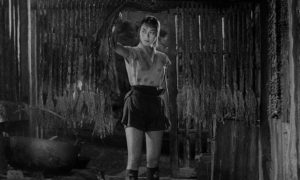Directed by Akira Kurosawa
Written by Kurosawa and others
Starring Toshiro Mifune as General Makabe, Misa Uehara as Princess Yukihime, Minoru Chiaki as Tahei and Kamatari Fujiwara as Matakishi
Saying that one of Kurosawa’s better-known movies rocks the casbah is the sort of insight you might find in a Larry King column: “The Beatles are easily one of the top 100 rock groups of all time. Not only is ice cream popular, it’s delicious too. Bill Clinton just might have been the most successful politician of the nineties.”
The Hidden Fortress is a good demonstration of what makes Kurosawa great. First, the characters are real. As the Princess says, we see the best and worst of people, rather than seeing good and bad people. Whether they are the comically base peasants or the capable and willful general, the characters are fully and sympathetically drawn.
The film has a wealth of visually spectacular scenes. One has hundreds of prisoners swarming down stairs as twenty or thirty riflemen try to hold them off. The riflemen are in two rows that slowly move backward. One row shoots, then retreats behind the second and reloads as the second-row shoots. Each volley pushes the swarm back momentarily and cuts its number. After the sequence repeats a couple of times it becomes clear that the swarm will overtake the riflemen. We see the emotions and behavior of individuals–courage, fear, rage–but the flow and outcome of the combat are mechanical. The scene is beautifully photographed and must have been a bitch to choreograph. In short, it is the work of a master.
While it is spectacular, The Hidden Fortress is widely and justifiably regarded as a second tier Kurosawa film, which is kind of like being a second tier Ivy League school. Other films, like Ikiru, and Redbeard have a greater emotional impact; Rashomon has more intellectual content and Seven Samurai has a comparable level of action, but is more dramatically effective than Hidden Fortress.
In my view, this is not so much because Hidden Fortress fails, but because of the fact that it is primarily an adventure film. It’s Kurosawa (somewhat) light. The drama, insight and characters are there, but this film is aimed more at entertainment than is most of Kurosawa’s work.
DVD Extras
If you’ve only seen Kurosawa on video, you haven’t really seen Kurosawa, especially in the case of his black and white films. The first time I saw a Kurosawa film in a theater–a double feature of Fortress and Throne of Blood–I was blown away. Not just by the beautiful photography but by the extent to which the clarity of the good prints, along with the size of the screen, increased the overall impact of the films and brought new subtleties to light. The existing videos of most Kurokawa films are like bad translations. DVD is not as good as film, but this one is like a good translation. You really are watching Kurosawa’s work, not a mediocre representation of it.
Ruthless Ratings:
- Film, Overall: 9
- DVD Extras: 6
- Story: 10
- Acting: 9
- Direction: 10
